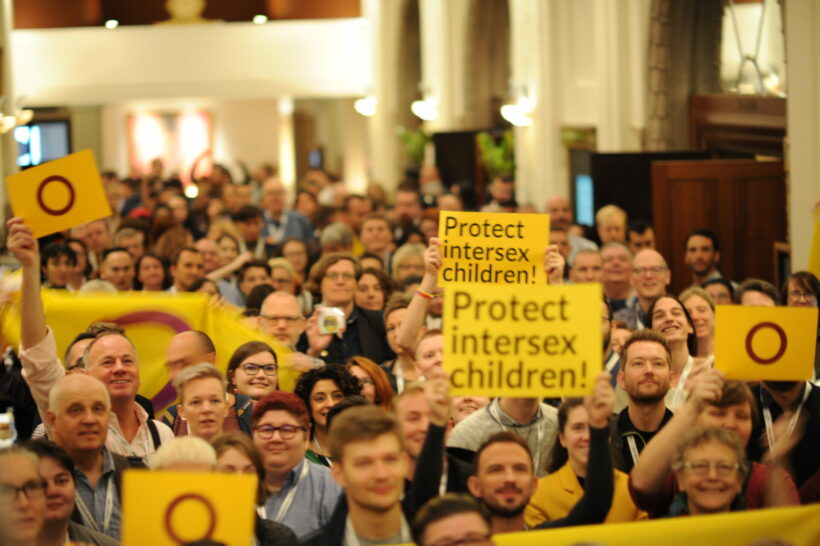Geneva, 12 December 2023 – A large majority of UN member States have yet to make any sufficient legal attempt to protect intersex people’s right to bodily integrity and autonomy. Still, a trend of positive developments is emerging, ILGA World said today.
The organization released the first edition of its Intersex Legal Mapping Report, a ground-breaking global survey on legal protections for people born with variations in sex characteristics. The publication features an overview of how each of the 193 UN member States is faring regarding the protection of the human rights of intersex people, profiles of the 34 countries in which legal developments have taken place, and an analysis of how intersex issues have been addressed in international human rights law. In addition, it also features interviews with intersex activists, providing unique insights into their advocacy work.
Intersex people are born with variations of sex characteristics (such as genitals, reproductive organs, hormonal and chromosomal patterns) that are more diverse than stereotypical definitions of male or female bodies. Up to 1.7% of the global population is born with such traits; yet, because their bodies are seen as different, intersex children and adults are often stigmatized and subject to harmful practices – including in medical settings – and discriminated against.
“As of July 2023, only six UN member States adopted laws prohibiting unnecessary medical treatments, surgeries, and other interventions modifying the sex characteristics of intersex minors without their free, prior, and fully informed consent,” said Crystal Hendricks, Chair of ILGA World’s Intersex Committee. “This striking dearth of legal protection is still a reality despite the unanimous, systematic, and urgent calls of intersex civil society and international human rights bodies. And yet, current positive trends give us reasons for hope.”
ILGA World’s Intersex Legal Mapping Report documents how the past fifteen years have seen a rapid increase in legal developments emerging to improve the situation of intersex individuals. As of July 2023, seven UN Member States had introduced national legislation prohibiting discrimination on the grounds of sex characteristics; five States adopted legal provisions on liability for offenses committed on the same grounds; and seven introduced other legal norms aiming to improve intersex people’s equal enjoyment of their human rights. In addition, there is a growing number of national and subnational legal developments aimed at addressing the needs of the intersex community.
“International human rights law is also playing its part,” added Ilia Savelev, co-author of the Intersex Legal Mapping Report. “Since 2009, intergovernmental organizations’ responses have evolved from indecisive suggestions to urgent and confident calls to legally prohibit and ensure accountability for non-consensual medical interventions on intersex minors.”
During the latest United Nations Human Rights Council in October 2023, for example, Finland, Chile, South Africa, and Australia led a group of 56 States from all regions of the world in a resounding call to “increase efforts to combat violence, harmful practices and discrimination based on sex characteristics”. On the same occasion, civil society organizations called for a UN resolution, which could lead to an official United Nations report on the matter: this would be an absolute first and raise awareness of intersex issues in a way that States could no longer ignore.
Civil society has indeed played a fundamental role in advancing the human rights of intersex people. “All the advancement obtained during these years are a testament to their relentless work,” said ILGA World co-Secretaries General Luz Elena Aranda and Tuisina Ymania Brown. “Activists have long decried violations to intersex persons’ right to bodily integrity, autonomy, and self-determination. But we know that these issues are not faced by intersex people alone: to different extents, these issues are also extremely relevant when it comes to gender equality and sexuality, but also disability, sexual and reproductive health and rights, or sex work. At a time when the policing of bodies has become a staple in the wider anti-rights agenda, cross-movement solidarity has never been more important. We hope that tools like the Intersex Legal Mapping Report will catalyze continued progress and change – not just for the intersex community, but for all of us.”
Key figures (as of July 2023)
The data listed here and in the report refer to the situation as of July 2023. For more updates about legal frameworks restricting interventions on intersex minors, visit the ILGA World Database at https://database.ilga.org/interventions-intersex-minors
- 6 UN Member States have laws prohibiting unnecessary medical interventions to modify the sex characteristics of intersex minors without their free, prior, and fully informed consent: Germany, Greece, Iceland, Malta, Portugal and Spain. Only two UN Member States – Greece and Malta – introduced specific sanctions for violating these prohibitions
- 181 (94% of) UN Member States haven’t yet made any sufficient legal attempt to protect intersex people’s right to bodily integrity and autonomy
- 7 UN member States have introduced national legislation prohibiting discrimination on the grounds of sex characteristics: Albania, Bosnia and Herzegovina, Denmark, Malta, Portugal, Spain, and Serbia
- 8 UN member States adopted legislation aimed to protect intersex people from discrimination on other grounds – Australia, Belgium, Finland, India, Montenegro, the Netherlands, and South Africa
- 5 UN member States have adopted legal provisions on liability for offences committed on the grounds of sex characteristics: Denmark, Greece, Iceland, Spain, and Malta
- 7 UN Member States introduced other legal norms aiming to improve intersex people’s equal enjoyment of their human rights: Andorra, Chile, Costa Rica, Greece, Iceland, Kenya, and the United States
- ILGA World has identified subnational laws and regulations that include provisions concerning intersex people’s right to bodily integrity and equal enjoyment of their human rights in Australia, India, Mexico, the Philippines, Spain, the United Kingdom, and the United States.
Follow this link to download the report: https://ilga.org/downloads/ILGA_World_Intersex_Legal_Mapping_Report_2023.pdf
About ILGA World:

ILGA World – the International Lesbian, Gay, Bisexual, Trans, and Intersex Association – is a worldwide federation of more than 1,900 organizations from over 160 countries and territories campaigning for lesbian, gay, bisexual, trans, and intersex human rights.






